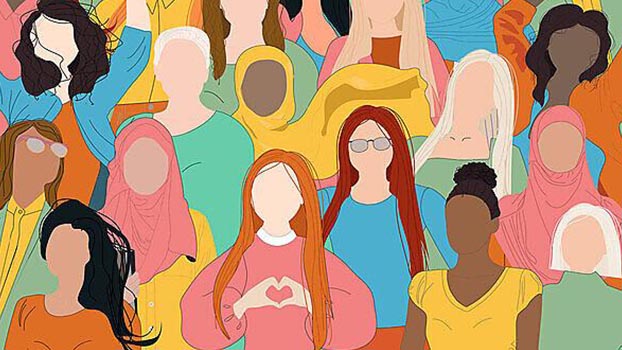Women in leadership: Achieving an equal future in a Covid-19 world


Dr Mortahina Rashid (Hima)
The theme of this year’s International Women’s Day is Women in leadership: Achieving an equal future in a COVID-19 world. This theme is time-worthy and it is time to celebrate successes of women leaders as different capacities in different parts of the world during this pandemic situation.
Forbes magazine has acclaimed the names of eight female leaders who are successfully combating the COVID-19 pandemic. They are Bangladeshi Prime Minister Sheikh Hasina, German Chancellor Angela Merkel, New Zealand Prime Minister Jacinda Ardern, Iceland Prime Minister Katr-n Jakobsdottir, Finland Prime Minister Sanna Marin, Denmark Prime Minister Mette Frederiksen, Norway’s Prime Minister Erna Solberg and Taiwan President Tsai Ing-wen. They came forward and take all the necessary and praise worthy steps which made them successful.
Bangladeshi women usually face so many challenges throughout their entire lives. Over the past year, our women have been fighting against COVID-19 pandemic as health care worker, caregivers, scientists, police, bankers, journalists, community mobilizers and as political and social leaders. COVID 19 has already highlighted great contributions of our women in decision making, policy and laws that work better for all, while it has intensified the extent to which women and girls carry unequal burdens throughout their lives because of gender inequalities.
To uphold women’s rights and fully leverage the potential of women’s leadership in pandemic preparedness and response, on International Women’s Day the World Health Organization (WHO) gave a message of hope from women trying to achieve an equal future - in health and beyond - in the world’s largest refugee. camp.
A Rohingya female leader, Shakiya is helping women and girls navigate challenges and opportunities in the Cox’s Bazar refugee camps to enhance health seeking behaviors, including sexual and reproductive health services. Shakiya fled from Myanmar in August 2017 with her father, sister, husband and children. Despite the tragic events which led her family to seek refuge in Cox’s Bazar, Shakiya - also known as ‘ShantikanaApa’ (peace-building Sister) - decided to look at the bright side of life and worker to educate women and girls at the refugee camps while linking them with much needed sexual and reproductive health and gender-based violence services.
There are so many women who are still working at the frontlines encountering many challenges. One of those women is Dr. Israt Imroze Shorna who is currently working as a child specialist (registrar) in IbneSina Hospital. Dr. Israt Imroze Shorna shared her feelings in working during this pandemic situation:
“First time I cursed my fate that why I was born as a female. I could not visit my COVID 19 affected parents to ensure safety of my children and in laws. I had to visit hospital regularly. I could not touch properly new born baby patient like before due to fear of COVID 19 infection and during discharging time patient’s parents requested me to remove my mask from the face so that they can see me and thank me properly. After returning from hospital I was afraid for my family and kept myself isolated from them.” She added that she had to wear PPE and N 95 mask for 8 hours during her duty without eating and urinating which were very difficult for a female.
Another frontline fighter is Joinob Khatun Popy. She is an Executive Magistrate at government of the people’s republic of Bangladesh. Joinob Khatun Popy said that “we were at risk because in the beginning of the pandemic we had to contact with the people as we were obliged to perform our duties. I have two children and I had to be more conscious to protect them from this virus. On the other hand, some of my colleagues were reported with COVID19 virus which made me down to some extents. I used to think I can be infected by this virus as I used to distribute relief and conduct mobile court. Along with our normal duties we were working for awareness raising and maintaining lock down.”
Mohotarema Rashid is a university teacher who is working as an assistant provost at Bangladesh Army University of Science and Technology. She said,
“During COVID-19 pandemic I had to conduct my online class. Sometimes I conducted it from home through zoom/ google meet; sometimes I had to visit my office for official and administration purpose. I was not afraid to serve but I was worried about my parent’s safety, for this reason I stayed far from my home. Even I celebrated Eid day without my full family members. During this pandemic I have seen so many mental health issues among my students, most of them were female. This mental health issue caused so many problems in their personal and academic life. I want to emphasize on institutional mental health counseling which could be very necessary and effective.”
On this year’s International Women’s Day, we celebrated the achievements of our women in different capacities, who irrespective of their walks in life, educational background and social and economic conditions strived to achieve an equal future for all. The words of Shakiya, Dr. Israt, Joinob Popy, Mohotarema represent all the women frontline fighters and give us the message that women can equally fight against COVID-19 and contribute to country’s achievement.
Dr Mortahina Rashid (Hima) is Senior Nutrition Security Officer, Eminence Associates for Social Development.



